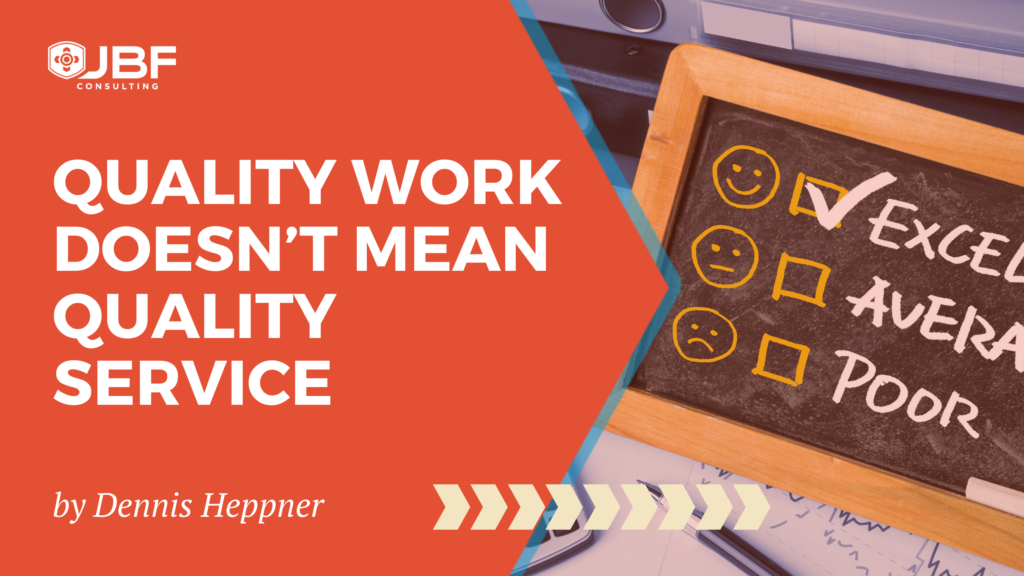I have been re-reading David Maister’s timeless classic, Managing the Professional Services Firm (hard to believe it is over 20 years old; yet still relevant). One chapter in particular resonates: Quality Work Doesn’t Mean Quality Service. In it, Maister uses a simple scenario to paint a picture distinguishing good work from good service.
In a nutshell, after having your car repaired at a local garage a neighbor has a similar problem and asks “Did they fix your car?” After answering , “Yes, they did a good job”, the neighbor asks an interesting follow-up question, “Did you get good service?”

“People don’t care how much you know until they know how much you care”
What does the second question mean? Yes, they fixed the car. That was the service provided; what else is there? Well, your friend not only wants to know that the work was competently done at a fair price. But what about other factors that influenced your choice and ultimately your recommendation.
- Was the shop amenable to your schedule?
- Did they tell you what was done and why in terms you could understand?
- Did they make you feel your repair is important to them, or just one of many that day or week?
- Did the mechanic ask you questions to help diagnose the problem, or just have you leave it so they could figure it out and let you know?
The point here is that quality service goes beyond having technical expertise to fix the vehicle. The savvy mechanic knows that he or she is also servicing the owner of the car. Simple things such as responsiveness, patience with your queries, attitude, and gratefulness for your business separates good from great (and generates referrals!).
Let’s take a look at how this plays out in the professional services space. For the most part every professional services firm has the competency to perform your work. Is there really that much difference between one law firm and another? Most CPA’s will competently do your taxes.
Most consultants have domain knowledge in spades. But what, especially over time, happens to my perception of their work? I might think the firm I hired did a good technical job, but I am not the expert (or I probably would not have hired them). However, my perception of good work can change if my legal contracts cause problems, the tax advice did not result in benefit, the business strategy did not pan out, or the car stopped running.

“ Clients buy services that are experienced, not just products that are consumed”
So how does the sophisticated client truly evaluate the provider’s service?
I submit that clients are smarter than we give them credit. Consciously or not, clients are shopping for trust, confidence, peace of mind, and reassurance as much as they are for pure technical ability. They consider approach, style, culture, and attitude that syncs with their own. In short, clients buy services that are experienced, not just products that are consumed.
Maister refers to “The First Law of Service” SATISFACTION equals PERCEPTION minus EXPECTATION.
If a client perceives service at a particular level but expects more, he or she will be dissatisfied. It is important to note that neither perception or expectation are necessarily reality - they are both experientially unique to that individual. So what is the services firm to do?
I have found it to be rather simple actually - know your stuff, be client-centric, and treat them as you would like to be treated. Strive to get to know the person or people you are working with. Put yourself in their shoes. Imagine what is keeping them up at night and have empathy regardless of your degree of concern.
- Be ready to deliver bad news as readily as you would good news, but have solutions ready to consider.
- Answer questions about the project before they are posed.
- Respond immediately to after hours requests, even if to say ‘Got it. I will have a detailed response first thing in the morning’.
- Offer your hand as they undertake a new journey.
- Guide and coach.
These things matter more than you think.
A client who is delighted by your quality of service is more likely to engage you for the next project. Most experienced service professionals have those 5-Star clients that never ask about cost; they just want assurance that things will be done right with that special touch.
Remember, “People don’t care how much you know until they know how much you care.”
Dennis Heppner is a Principal at JBF Consulting. Dennis’ expertise in transportation, logistics and supply chain operations, and third-party providers spans 25+ years. His experience is broad-based, spanning entire supply chains, including business process redesign, sourcing, distribution network design, transportation management, distribution operations, outsourcing selection, and business strategy for major manufacturers, distributors, retailers including eCommerce, and service organizations.
About JBF Consulting
Since 2003, we’ve been helping shippers of all sizes and across many industries select, implement and squeeze as much value as possible out of their logistics systems. We speak your language — not consultant-speak – and we get to know you. Our leadership team has over 70 years of logistics and TMS implementation experience. Because we operate in a niche — we’re not all things to all people — our team members have a very specialized skill set: logistics operations experience + transportation technology + communication and problem-solving skills + a bunch of other cool stuff.


